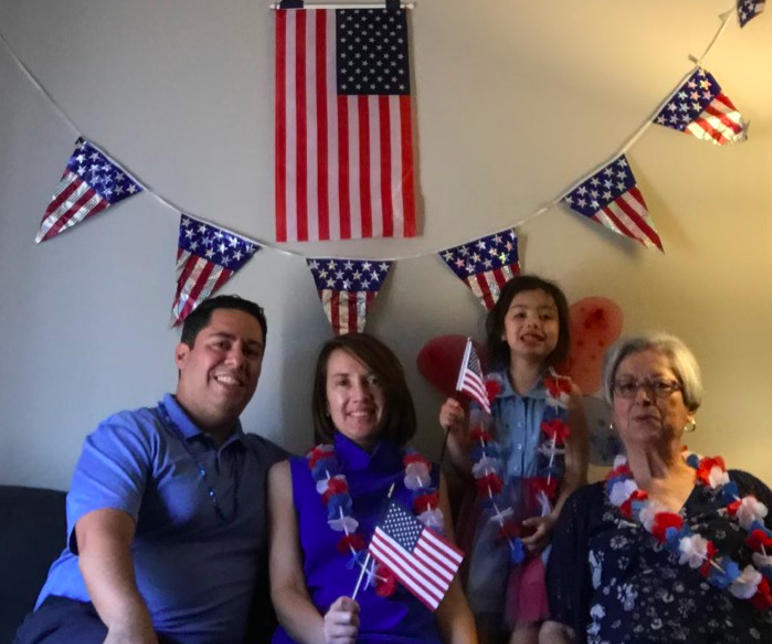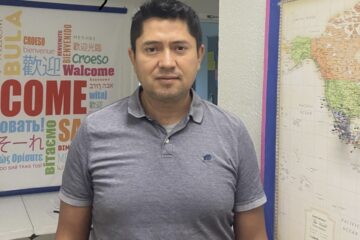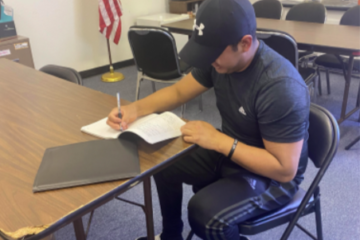Congratulations to Angela Suarez, U.S. Citizen!
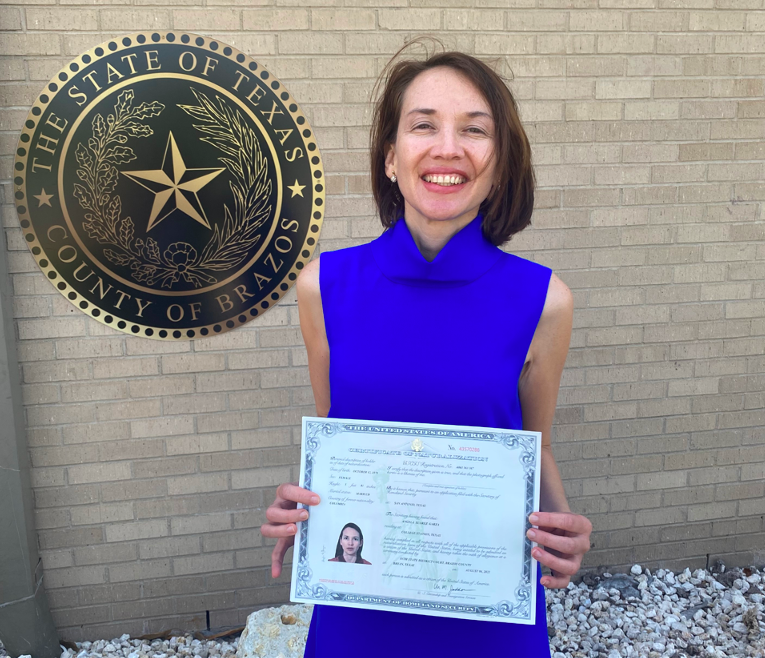
Angela Suarez had given up much to move to the United States in 2014. As a young educated professional in her native Colombia, she had a thriving practice as a psychologist, a deep circle of friends, and the comforts of speaking her native language, knowing how things work and that she belonged there. But due to increased political and economic turmoil, much of her extended family, including her parents and siblings, had already moved to the U.S. For Angela and many others, family matters more than anything else. So when the authorization for her to enter the U.S. on a family reunification visa came through in 2014, she courageously wrapped up one phase of her life and began another.
In a previous post, we considered many of the challenges that Angela faced in her first few years of living, working and learning in the U.S., as she moved from California to Austin, Texas, and finally settled in the Bryan/College Station area. Like other immigrants who speak little to no English, whose degrees and credentials have suddenly lost marketable value, and who have to start over in almost every aspect of daily life, Angela had her work cut out for her. But she embraced the struggle, took some calculated risks, and gradually made a new life for herself. She began to learn English, found housing and jobs that slowly improved over time, and made connections with people who recognized all that she had to offer.
By 2017, she had met and married her husband, Adrian Garza, and moved to College Station. Cognizant of the many difficulties that immigrants face at any age, Angela worked for a time as a classroom aide in the “newcomers” program at Bryan ISD. In 2018, Angela’s and Adrian’s daughter was born, bringing great joy to them and their extended family. By 2019, having been a legal permanent resident of the U.S. for five years, Angela was both eligible and determined to apply for citizenship. In her search for resources to help with this process, she discovered and joined BIIN’s citizenship classes in the fall of 2019, attending regularly and participating actively. “I’ve been so blessed and I’m thankful to all the community here, especially to Brazos Interfaith Immigration Network,” she affirmed. “They helped me a lot with the preparation for the citizenship interview and exam.”
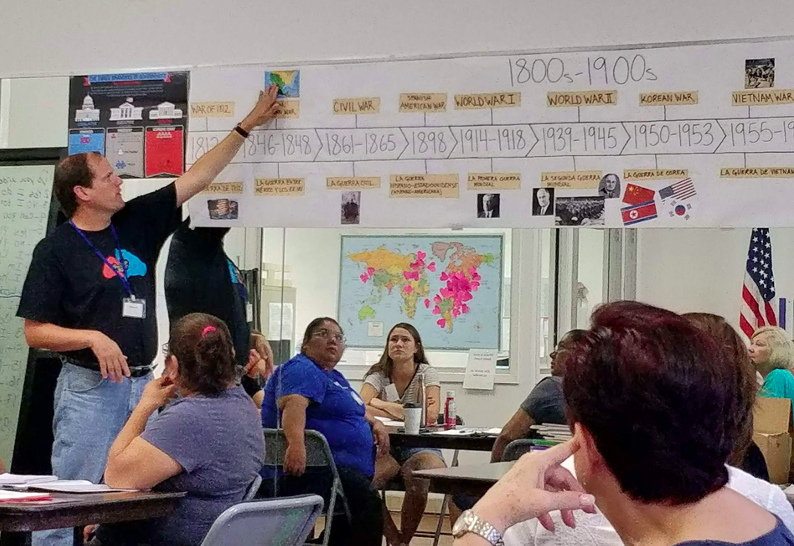
With help from immigration lawyer Laura Leon, Angela completed all the paperwork required and submitted her naturalization application and fees to USCIS in March 2020 – just as the coronavirus pandemic was spreading in the U.S., leading to the suspension of many vital services. Like many parents of young children, Angela hunkered down at home with her young daughter and did her best to adapt to the “new normal.” While USCIS acknowledged receipt of her N-400 form and fees, a long period of waiting ensued.
In February 2021, word came that the biometrics assessment that Angela had submitted previously to renew her green card would be accepted for the purposes of the citizenship application. (USCIS was struggling to deal with the backlog of requests for many services, and had finally found ways to expedite some parts of the naturalization process.) That was a welcome piece of information, but it was followed by many more months without any news at all.
Knowing that she would eventually have to pass the in-person exam and interview with a USCIS officer in English, Angela continued to learn what she could and keep her connections with the material fresh. Besides participating in another round of citizenship classes at BIIN, Angela found and watched YouTube videos that walked viewers through the naturalization process. She practiced listening to and answering in English the 100 questions about U.S history and civics that USCIS draws from for applicant interviews. She joined a Facebook group designed to support prospective citizens, and used that connection to share what she knew as well as to learn from others. There was no way to know how long the wait would be, but Angela was determined to be ready, when her turn came.
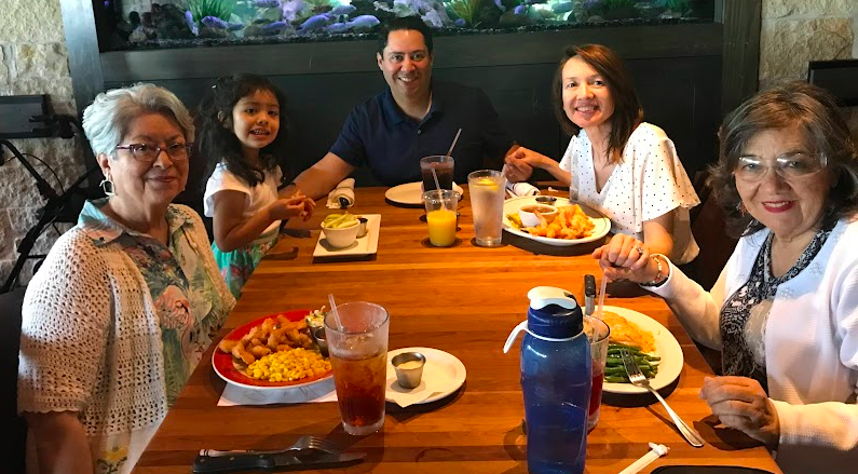
At last, in May 2022, more than two years after she had submitted her application and fees, Angela learned that her application was under “active review.” A week later, she was assigned a time to appear at the USCIS Field Office in San Antonio, on July 5, for her exam and interview. Her mother, Bianca Suarez, who was already a U.S. citizen and had sponsored Angela, was able to come to Texas from California. Along with Angela’s husband and daughter, her mother accompanied her to San Antonio for the days around her interview. Their presence at this juncture meant a great deal to Angela, who had come to the U.S. primarily in order to be closer to family, and had married and become a mother along the way.
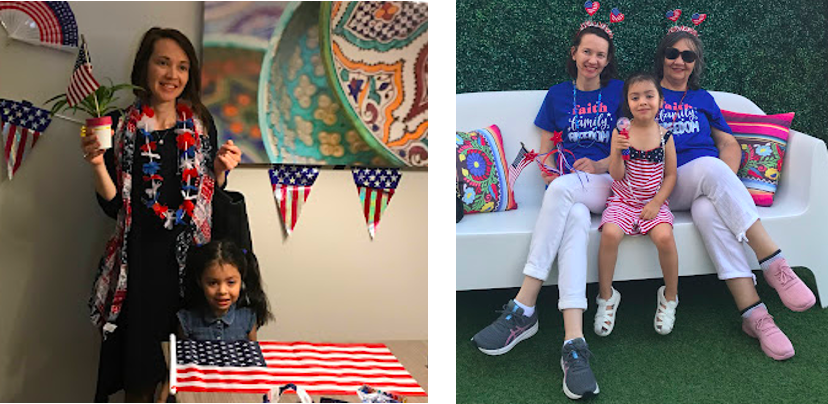
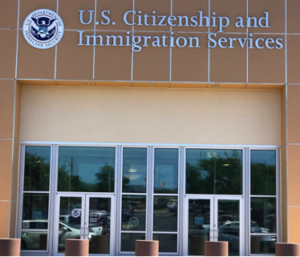 Precautions related to the pandemic still hung over the process, and Angela had to leave her family at the door of the USCIS Field Office, as she entered the building masked, and proceeded through security checks. She moved through several bureaucratic steps while engaging with USCIS personnel in small talk, knowing that her abilities in English were being judged, before finally entering the room with the officer who would conduct the interview and exam.
Precautions related to the pandemic still hung over the process, and Angela had to leave her family at the door of the USCIS Field Office, as she entered the building masked, and proceeded through security checks. She moved through several bureaucratic steps while engaging with USCIS personnel in small talk, knowing that her abilities in English were being judged, before finally entering the room with the officer who would conduct the interview and exam.
After so much preparation and waiting, the interview itself unfolded surprisingly quickly. The USCIS officer verified some information, asked Angela six questions about U.S. history and civics drawn randomly from the set of 100 (all of which she answered correctly), and gave her a short written exam in English. The officer then told her that she had passed, and would be eligible to participate in the next swearing-in ceremony to be held in Brazos County. Clutching the paper that confirmed her success at this marathon, Angela stumbled outside, buoyed with relief, to share the good news with her family. Celebrations in San Antonio continued that night!
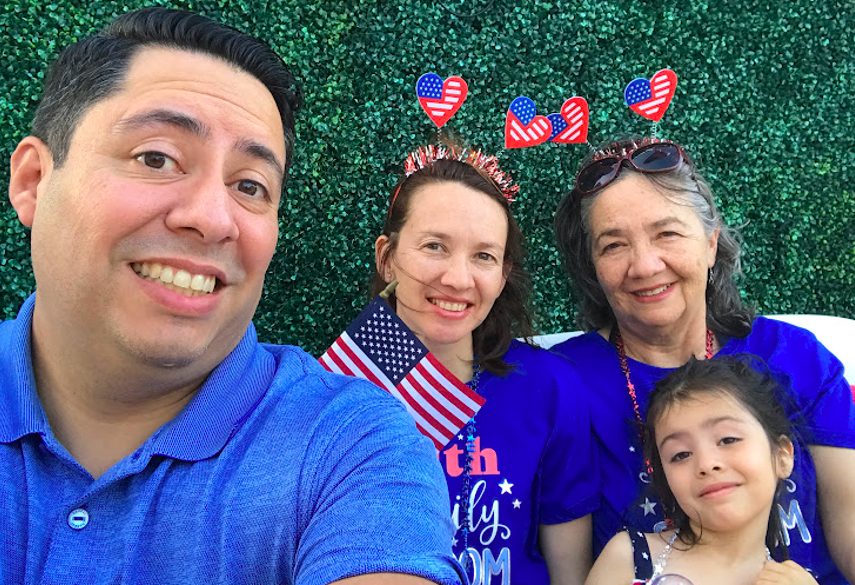
A few weeks later, Angela learned that the final ceremony would be held at the Brazos County Courthouse on August 4, at 10 a.m. She was relieved to learn that families could actually attend this part of the process, although they were expected to arrive at 8:30 am, to allow time to pass through a security checkpoint. As it turned out, her mother had planned a trip back to Colombia at this time, but Angela’s husband, daughter and mother-in-law were able to be with her for this occasion.
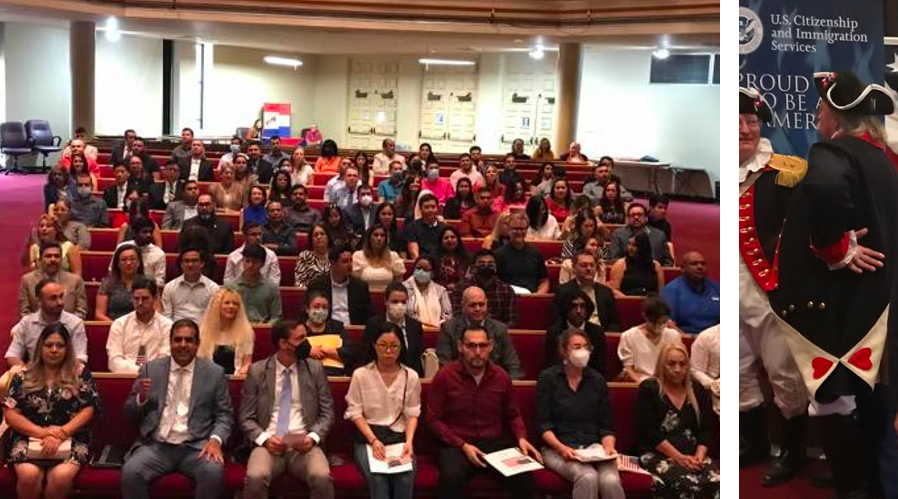
On the morning of August 4, the chamber filled with excitement, as families, dressed to the nines and bearing flowers, made their way through security and found seats together. At last, the judge presiding over the ceremony, the Honorable Kyle Hawthorne of the 85th District Court, entered the auditorium adorned with red, white and blue buntings. Judge Hawthorne was accompanied by a corps of military veterans, bearing American flags and dressed like Revolutionary War soldiers, meant to invoke both the history and the patriotic values to which the new citizens were now being joined.
Describing the scene, Angela said she was very surprised by the pomp and circumstance: “I didn’t expect that the ceremony would be such a big thing, but it was a beautiful gesture” – a way of connecting present to past, and of honoring the sacrifices and commitments that the new citizens had made and were prepared to make, on behalf of their new country.
Together, everyone recited the Pledge of Allegiance, and then turn by turn, the new citizens were acknowledged and asked to stand, as their names and “former countries” were called. At this ceremony, almost 100 new U.S. citizens were sworn in; while over a third were natives of Mexico, Angela was the only person from Colombia.
Yet for Angela, even more powerful than hearing her name called as the sole representative of Colombia were the words spoken by the mayors of Bryan and College Station, as they welcomed the new Americans. As she recalled, “One of the mayors said, ‘We need your talents, your culture, all that you bring that makes this community diverse.’”
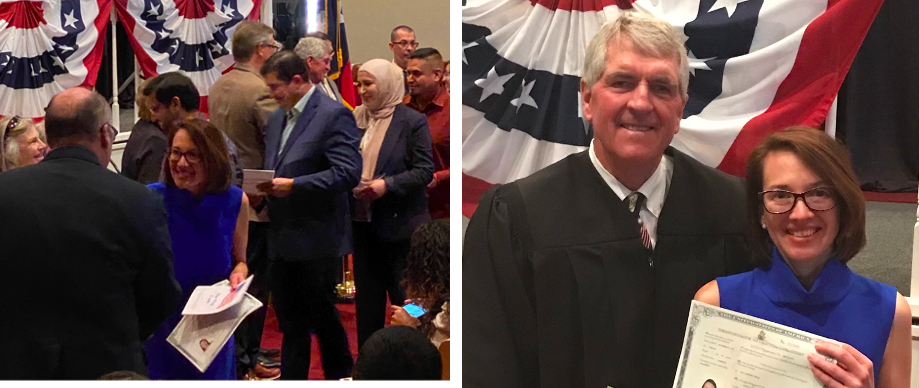
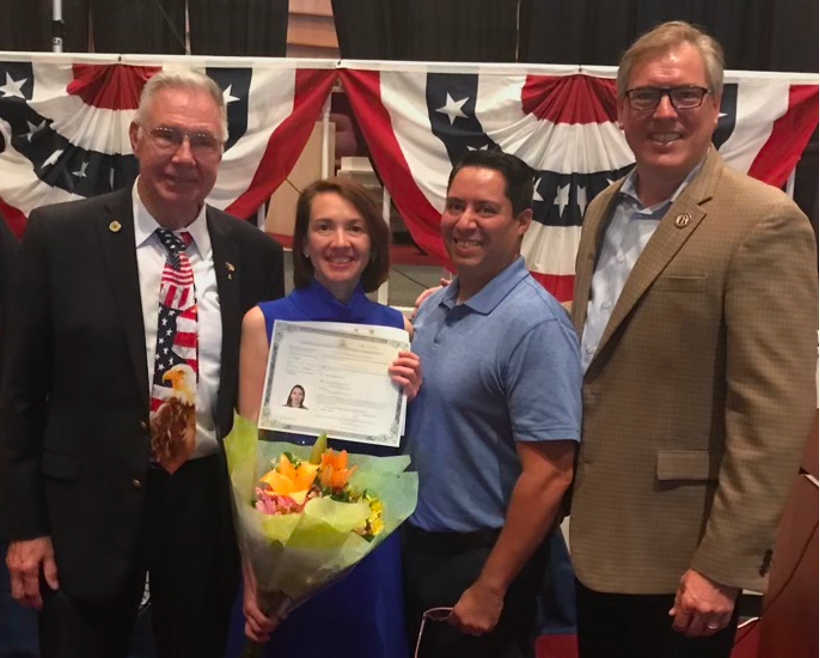
The message that Angela heard loud and clear as a newly sworn-in U.S. citizen was one of welcome and of responsibility. As she explained after the ceremony:
Citizenship comes with not only rights but also a lot of responsibilities, and one of them is to be part of the democracy. That is a huge thing! I am going to be able to vote, and do other things… As they said – and I agree with this – we [new citizens] need to be part of the change, we are the change. We need to serve the community with our creativity and knowledge. So in order to give back to this beautiful country, I’m planning to put into service all of my talents and everything that I can offer to my community.
Angela is already acting on her desire to “give back” and to share her considerable talents, to the benefit of others. She has started an informal support group for women that meets in her home, conceiving of it as an opportunity to build community while sharing stories and skills with each other. “I love to facilitate groups,” she says, “And it’s important to have a time for us, as women, to share our experiences and learn with each other.”
She has also spoken with clergy at Santa Teresa Catholic Church, to discuss how she might help connect with women and families in the predominantly Latino parish. In addition, looking for ways to apply her background in psychology, Angela has been taking training to become a certified life coach, through Family Life Consulting Services. She looks forward to the point when she will be able to take on clients, both in person and online, offering her skills as a bilingual professional who understands the challenges of living in a meaningful way, when circumstances change and one is forced to adapt.
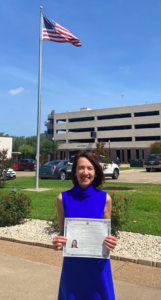 Eager to connect with others who are still on the path to citizenship, Angela has also offered to serve as a volunteer or guest speaker in BIIN’s English and Spanish citizenship classes, as they start up again in person this fall. As she puts it:
Eager to connect with others who are still on the path to citizenship, Angela has also offered to serve as a volunteer or guest speaker in BIIN’s English and Spanish citizenship classes, as they start up again in person this fall. As she puts it:
I want to help other immigrants to have this experience, and not be afraid. I want to tell them, ‘You just have to do it! You go through the process, and you will get it, just as I did.’ I want to encourage other people who speak [English] with an accent. I want them to know, ‘It’s ok, you just have to practice, and then you will do it. You will feel a lot of relief.‘ When you become a citizen, the doors are open to you in a different way.
Angela Suarez has been opening doors, honing her skills and overcoming fear ever since she left the comforts of Colombia, the place she knew and loved, eight years ago. With courage and tenacity, she has made her way, looked for help, and along with family and friends, created a new place to call home. And as a newly minted U.S. citizen, Angela is already doing the work of welcome: building community and encouraging others to take steps towards a better life and to do whatever they can, to make this community a better place for all who live here.
Thank you, Angela, for sharing your story and for reminding all of us that regardless of the path we took to get here, the language we speak, or the work we do, we all have a stake in the well-being of our communities and the future of this country. Working together, we can all contribute to being the change that our country and our world need.
